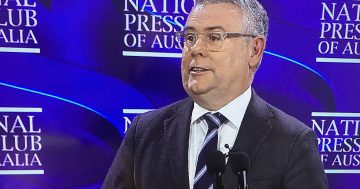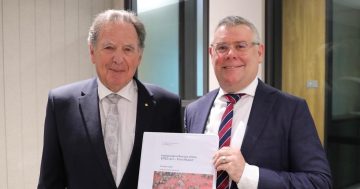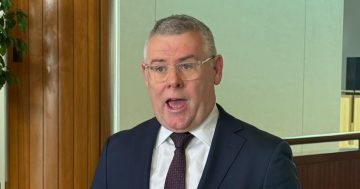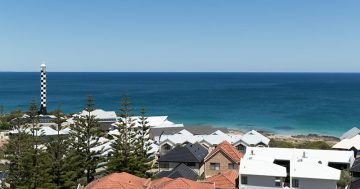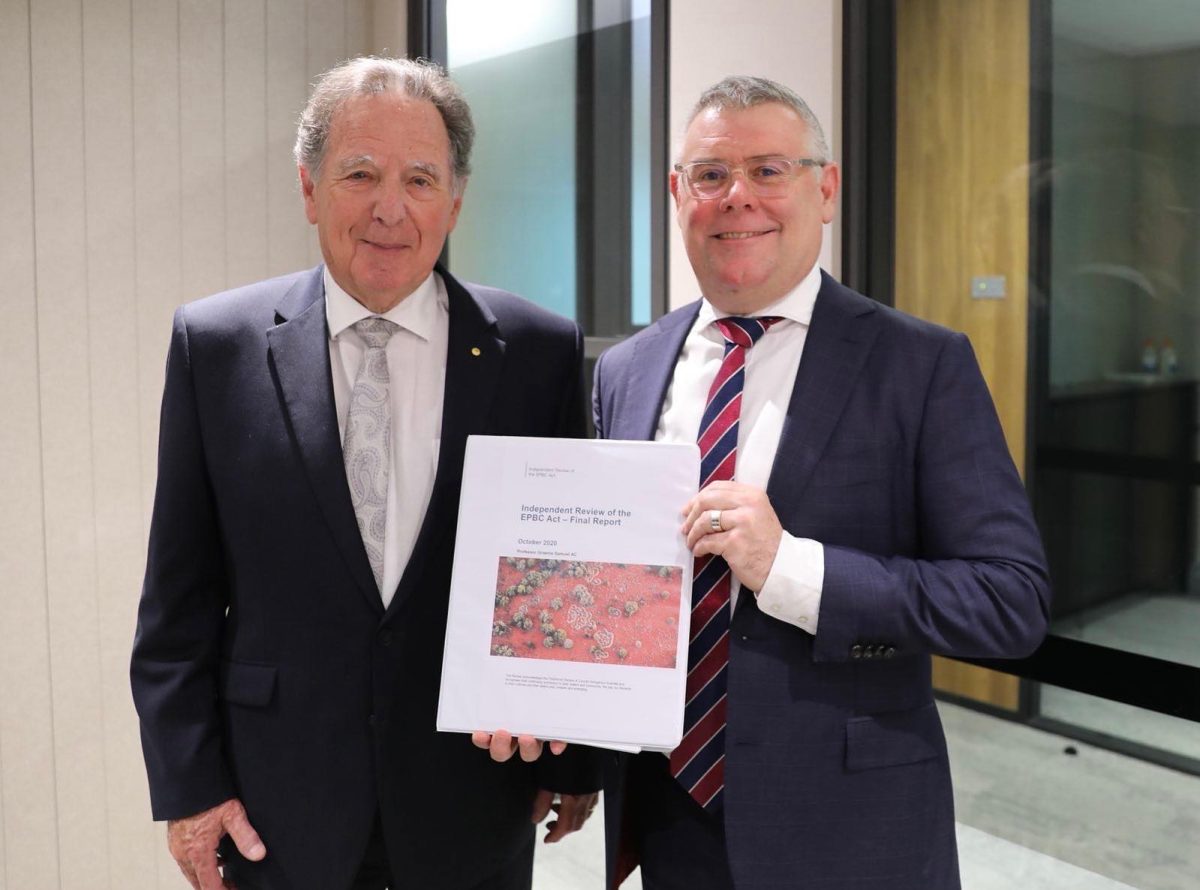
Graeme Samuel and Environment Minister Murray Watt present Professor Samuel’s 2020 report to government on Australia’s environment protection laws. Photo: File.
Australia’s landscape and natural environment will soon include legislated “no-go” zones from which developers will have to keep clear.
Environment Minister Murray Watt confirmed his overhaul of the nation’s environmental protection laws would focus on speeding up approval processes for developers but also on banning them from protected areas.
On the flipside, “go zones” will identify where individual development assessments will get an easier green light.
Addressing the Smart Energy Council this week, Senator Watt said his top priority was to fix Australia’s “broken” environmental laws to facilitate the nation’s transition to net-zero emissions.
He aims to have the legislation introduced to parliament before the end of the year. It will include a new regional planning model that assesses overall impacts on native habitats.
“Regional planning improves environmental outcomes by better managing threats to nature, identifying areas of high environmental sensitivity that should not be developed and guiding restoration activities in areas that have been degraded,” Senator Watt said.
“Regional planning also benefits business by providing better information on local environmental values to enable informed planning and decision-making, identifying areas where development will simply not be allowed, and areas where individual project assessment and approval would not be required.
“This approach – identifying ‘go’ and ‘no-go’ zones in various regions upfront – would shift the focus from project-by-project development to effective planning for our environment and for sustainable development.”
The approach was a key recommendation of Graeme Samuel’s 2020 landmark review that concluded the Environment Protection and Biodiversity Conservation (EPBC) Act was failing nature and business.
Professor Samuel noted that planning for and managing development impacts at a landscape or regional scale delivered a better outcome for the environment and for business.
Senator Watt said while such a move would assist development across a range of industries, it would be of particular value to the renewable energy sector as it attempted to build at large scale with speed and efficiency.
“A regional plan can de-risk your projects up front, providing better environmental outcomes and more certainty for investors,” he said.
Reforms to the EPBC Act will include legislative changes to allow for greater use of regional planning, in partnership with states and territories.
The Federal Government has been trialling regional planning through pilot programs in partnership with the Queensland, South Australian, NSW and Victorian governments.
Senator Watt said it was now time to take it to the next level to provide certainty for communities and industry while also better protecting the environment and ensuring Australia reached its renewable energy targets.
Smart Energy Council chief executive officer John Grimes welcomed the announcement, saying the government was finally coming up with a map.
“A map that says, build here because the environmental impact is negligible or manageable. Don’t build here because there are environmental concerns,” he said.
“Nobody in industry wants to waste time and money developing proposals that are then ultimately knocked off.
“That’s actually very inefficient in terms of the opportunity cost and it’s really going to slow the transition down.”
The Renewable Energy Alliance also welcomed the news but stressed the legislation had to get the concept of regional planning right.
National director Andrew Bray said the key to getting it right would be ensuring local communities were engaged on where ‘go zones’ and ‘no-go zones’ were located in their regions.
“Desktop environmental data is a useful first step, but must be validated by local expertise,” Mr Bray said.
“Some regional communities at the centre of the shift to renewables are telling us they’re concerned about the environmental impacts of projects, so we welcome measures that give communities confidence that projects are being built in the right places.”
ACT independent Senator David Pocock hosted an environmental law reform roundtable in Canberra on Wednesday (10 September) and emerged from it saying it was critical the government got the legislation right.
“This is the government’s chance to deliver for this incredible continent, for all of us, for our children and for future generations,” Senator Pocock said.
“It’s an opportunity to strengthen our laws so they actually safeguard our natural heritage.”
Original Article published by Chris Johnson on Region Canberra.


